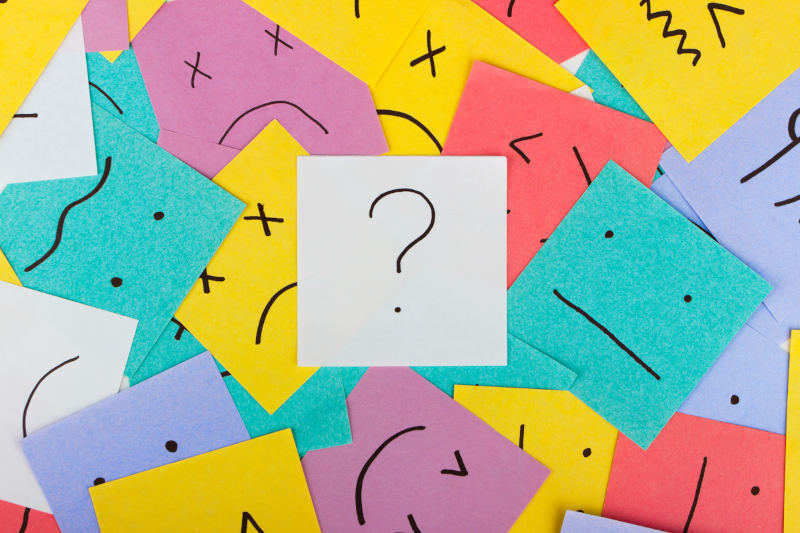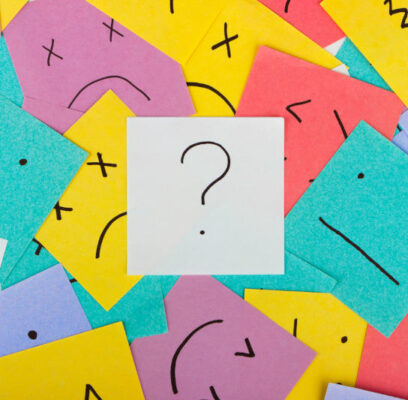In 2006, when I was in college, there was a bird flu outbreak that started with domesticated chickens in China. It didn’t end up being a pandemic, but the word was thrown around a lot. During this time, a friend eliminated chicken from her diet to be on the safe side. I knew that eating chicken didn’t transmit the disease, and that in any case, cooking the chicken should negate that risk.
But one night, at a Mexican restaurant, she made a point of ordering anything but chicken. I’d planned to get chicken enchiladas, but I couldn’t shake the thought that maybe, just maybe, in some freak case, I could get the bird flu from eating chicken.
I ordered bean enchiladas. I’m sure they were delicious, but mainly, it was easier to stop eating chicken for awhile than to have thoughts of freak bird flu aggressively poking at my brain-parts every time I ate poultry.
At the time, I didn’t know I had obsessive compulsive disorder, or that I’d spend fourteen years fearing a pandemic before we finally had one. Pandemic was the Lord Voldemort of my own personal phobias: say its name, I feared, and it would come.
As you can imagine, the last two years have been rough. On my last day in a physical office—right at the start of the pandemic—I started washing or sanitizing after I touched any doors at work. I sanitized my hands after I made a copy. I sanitized my hands after I opened the fridge. I held my arms up like chicken wings so they wouldn’t touch my desk or the conference room table.
Remember all the face-touching everyone was obsessed with early in the pandemic? Face-touching, for all that it spreads germs, is also a natural human behavior. For years, if I touched my face, a twitchy feeling would come over me, and I would surreptitiously take a pump of sanitizer and mimic the face-touching I’d done seconds earlier, scratching at my face with the sanitizer.
I’d worked hard to be able to touch my own face without falling into squirrelly twitchiness immediately after, and in general, I’d put a lot of work into sanitizing my hands less.
On that last day, seven years of progress evaporated like hand sanitizer in a matter of hours.
But this isn’t about the germs—it’s about the uncertainty. What matters isn’t that I ate a slightly different plate of enchiladas more than a decade ago; what matters is the thought process behind that choice, and how I ignored the logical voice in favor of doing something that would calm me down.
I make those decisions every day, and have done so for years. The obsessions and compulsions that show up with hand washing are a template, and it shows up other places as well. At the center of that template is uncertainty. Why did I wash my hands a second time? Because I wasn’t certain I did a good enough job.
Sure, life is full of uncertainty. You can’t get around that. I don’t know how I’m going to die, although my four-year-old thinks I should know this. (Yes, it was a disconcerting conversation.) But part of OCD—the part that’s been my own hallmark experience—is having poor tolerance for uncertainty.
I won’t use canned air to clean my keyboard because there’s a warning on the canister about how misusing it could be fatal. “There’s almost no chance that will happen,” my brother pointed out.
Of course there isn’t—and I know that. These anxiety-based thoughts and fears are a scythe undercutting what I know, intellectually, to be true. But I also walk by pots crusted over with old tomato sauce and think, “Oh, god, I hope I don’t lick that.”
It’s not ignorance. It’s about seeing a .0002% crack of uncertainty where, in some parallel universe, I lick the crusty pot and shove an air nozzle up my nose for no actual reason.
It shouldn’t mean a damn thing, but I’m unable to get past it because it’s still uncertainty. That I imagined it happening doesn’t help matters.
Poor tolerance of uncertainty has affected my writing as well. It slipped under the radar for years, until I found myself taking extensive notes during a revision, and questioning whether or not I wanted to note down smaller word and sentence changes, or stick to the big stuff on that pass.
Should I note that down? It’s kind of a small thing, and it takes time to add all these notes. I’ll get it when I type in my changes. Hmm. But what if I don’t notice it a second time? What if I become desensitized to the raging dumpster fire of my own inadequate first draft word choices? What if I forget? What if it stays like this all the way into the final draft? What if I do this every time, allowing an unacceptable level of laxity to slip into my work?
Except for the original thought about the draft, most of this happens non-verbally. In The Perfectionist’s Handbook, Jeff Szymanski writes that a lot of these internalizations sound ridiculous when you write them down. As a fiction writer, I definitely wouldn’t give the above internal monologue to one of my characters. It feels like a cartoon character. Like Wade the Duck.
Examining and verbalizing these thoughts—and deciding if they’re ridiculous—is, incidentally, part of dealing with them. (Thanks, therapy!)
But that doesn’t mean they have no power in the moment. If you looked at my monologue from the outside, you’d see me reading through a draft, making brief notes on the page, then flipping through my notebook to add them to the right section. You’d see me pause here and there to add numbered notes.
Then I stop. Hesitate. My pen taps the page. I go for the notebook. Change my mind. Try to go back to reading. My eyes flick back to the spot that stopped me. Pen hovers again. Rinse and repeat a couple times. I give in and write down the note.
The incident above is probably something that happens to everyone at one point or another, and it’s not a big deal once in a while. But the thing is, I have OCD. So take the above example, and multiply it. I’m not sure what you’re multiplying it by since I lost count, but figure the equation involves a 1125-page manuscript of 234,000 words.
A single grain of sand? No big deal.
Tons of sand? Kind of an issue. It can bury you. Just ask the Fremen.
Now figure, it’s not only a writing problem, and it’s not only a germ problem, either. It’s checking locks and burners, not once or twice, but over and over again. It’s washing dishes in concentric circles and filling the kettle up to the count of thirty, even though that makes it overflow once it boils.
It’s a million other things that aren’t my OCD, but other people’s.
If I could stop doing these things, I would have. It’s the most frequent advice I get from others (“You should try not to do that anymore.”), and one of the earliest “solutions” that occurred to me, before I had my diagnosis. Just stop.
Stop doing that. Stop worrying. Stop being like this. Control yourself.
But it doesn’t work like that, and I expect this to be here for the rest of my life. If I put in the work, and if my life goes well, there will be times when I barely notice my OCD at all. I’ve had those times. And I’ve also had the stressful times that strain everything and make it worse. (Hello again, pandemic.)
Usually, when I conclude a piece of writing, I ask how all the above thoughts, questions, and experiences have affected me or changed me. What’s my takeaway from this whole thing? What questions do I still have? Inherent in any piece of writing—a complete one, anyway—is some uncertainty that comes to a resolution, or at least the start of a resolution. But all the uncertainty above? It doesn’t come to a neat point. The enchiladas, the germs, the counting—they don’t merge into a beautiful sunset of cohesive truth. They don’t add meaning to my life or raise provocative questions.
Sure, there are treatment options. At this point, I’ve been back in therapy for a little over a year. OCD has been my most intractable issue, but I’ve made progress elsewhere, like with perfectionism, and that often overlaps with OCD. Awareness, education, self-knowledge, and support from others, both professionals and personal support systems, can mean the difference between coping and not, surviving and thriving. I genuinely believe those things, and I try to live them, too.
But the idea of giving this too pat an ending bothers me. It feels like a betrayal of my lost seven years of progress. It’s not a lie, exactly, but a small-talk version of the truth. A Disney-fied version. It’s like someone asking, “And what have you been up to lately?” and you answer that, actually, you just got married to a prince, but you leave out the part where your sisters cut off their toes and heels.
So, where does that leave us?
When I get up from my computer, I’ll go out and sanitize my hands too many times and hit my car remote’s lock button too many times and continue to never cook with eggs because I’ll be trapped in a Dishwashing Loop of Uncertainty if I do.
This piece of writing will end, but my uncertainty lives on. But here, in this space, with my words, I have a power that I don’t have in every aspect of my life. I can skip the obsessions and compulsions, the repetitions and the circling. I can create the certainty that I don’t have elsewhere, even if my fingers hover over the keys before I do.
And so?
This piece of writing is over.
Image from depositphotos

